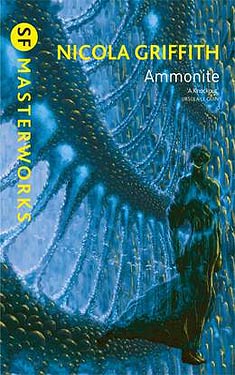Nicola Griffith
Completed 8/9/2020, Reviewed 8/9/2020
5 stars
Nicola Griffith is the most
nominated and one of the winningest authors of the Lambda Literary Award. This book was her first win. I really liked her second win, SlowRiver. Ammonite, however, feels like her
masterpiece. It was also her first novel. It felt carefully written, with wonderful
prose and beautiful characterization.
The premise is the basic trope of a planet of women, but it is done as
if women were simply people, not less than men, not greater than men, simply
people who have adapted to their environment.
She comments on this in her afterward, that her goal was to write a book
where the women’s characters are as varied as men’s in a typical mainstream
science fiction novel. This book also
won the Sideways Award and is considered a classic of science fiction about as
well as by women.
 Marghe is an anthropologist going
to the planet known as Jeep to study the culture of the women who inhabit it
for a corporation that wants to exploit its natural resources. The women are the remnants of a colony that
was decimated by a virus that killed all the men and many women. The women who survived somehow had children. The problem with going to Jeep is that the
virus is still active. Marghe, however,
is given an experimental vaccine for the virus, a pill she must take
regularly. She goes to Jeep, meets with
the survivors of the corporation’s base, and then sets off to live with some of
the indigenous cultures. On her way, she
is captured by one tribe. She escapes,
lives with another tribe, and discovers the secrets of the virus and people.
Marghe is an anthropologist going
to the planet known as Jeep to study the culture of the women who inhabit it
for a corporation that wants to exploit its natural resources. The women are the remnants of a colony that
was decimated by a virus that killed all the men and many women. The women who survived somehow had children. The problem with going to Jeep is that the
virus is still active. Marghe, however,
is given an experimental vaccine for the virus, a pill she must take
regularly. She goes to Jeep, meets with
the survivors of the corporation’s base, and then sets off to live with some of
the indigenous cultures. On her way, she
is captured by one tribe. She escapes,
lives with another tribe, and discovers the secrets of the virus and people.
Marghe is a very well-developed
character. Through her exploits, we
learn who she is, her past, and what she’s made of. Griffith does a remarkable job of giving us
the full range of emotions and experience of Marghe. This is most demonstrated during her escape
from the first tribe in the dead of winter in the far north of Jeep where the
weather is bitter and a blizzard comes through.
Some authors could make this tedious, but Griffith made me feel Marghe’s
courage and despair while she tries to save herself and her sanity.
In addition to Marghe’s story,
there is a plotline that follows the corporation’s base and its commander
Danner. Danner has serious self-doubts
about her abilities to lead. She is
conflicted by her duty to the corporation versus her people. Her doubts and conflict help create another
fully formed character with great complexity.
While not nearly as interesting as Marghe’s journey, Danner’s story line
is still riveting as she must deal with corporate spies and keep up the morale
of the base. Between Marghe and Danner,
I became a participant in the story, not just a spectator.
While anthropology in science
fiction traditionally makes it “soft” versus “hard”, I thought the discovery of
how the women of Jeep procreate was the best, most detailed explanation I have
come across in any book about an all-women’s society. I also thought the description of the virus was
well done and believable. These are two
aspects of the story that show just how well Griffith did with the world-building. In addition to these were the three cultures
she created, that of the base and the two very distinct tribes in which Marghe
lived.
I give this book five stars out of
five. I deeply felt a part of the complex
world that Griffith created, although, as a man, the virus would have killed
me. The prose was wondrous without being
heavy-handed. The characters were multi-dimensional. In the end, Griffith tied everything up
beautifully and believably, which made me joyous and at the same time terribly
sad that the book had to come to an end.
No comments:
Post a Comment